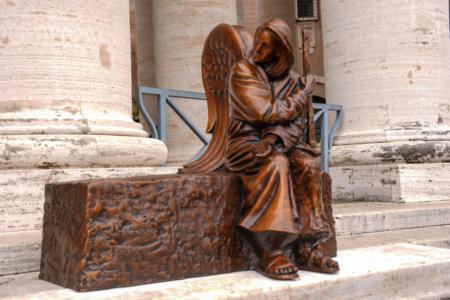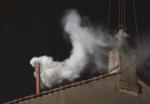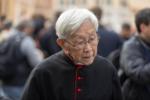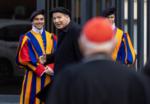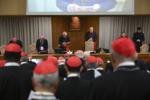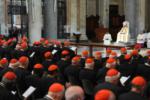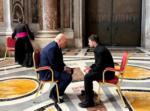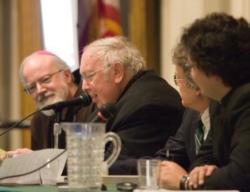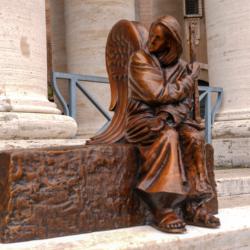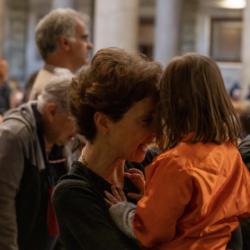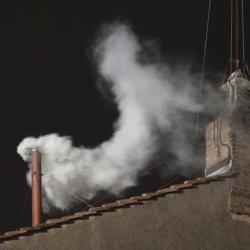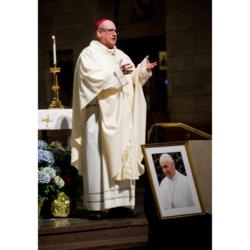Panel discussion focuses on role of education
BOSTON — The ecclesial movement Communion and Liberation hosted a panel discussion on education that focused on the fact that teachers should help students learn about reality without denying the mystery of life. The event, titled “Society? Church? It’s a question of education,” was held at Fanueil Hall on Jan. 14.
Participating in the panel were Archbishop Seán P. O’Malley, Msgr. Lorenzo Albacete, the national director of CL, Henrik Hertzberg, senior editor of The New Yorker and Father Jose Medina, a teacher at Georgetown Visitation Preparatory School in Washington, D.C.
“An event like this arises from our experience, our faith that has awakened in us a passion,” said Msgr. Albacete. “We experience this desire to know and to learn and to embrace.”
The purpose of education is to maintain us in reality, he added.
Father Medina said he encourages his students to raise their own questions from the world. Reality is something that attracts everyone like a good book that cannot be put down. It inevitably leads to the mystery, which is the “something beyond that has to do with everything,” he said.
The mystery gives purpose to everything, but people can still choose to ignore it, he added.
“This is precisely what has happened in our society,” he said. “We have somehow chosen to forget the mystery.”
Schools teach facts and avoid the unknown at all costs. Thus, the encounter with reality is no longer interesting, he said.
“Education is not indoctrination. It is the adventure of encountering this reality,” he added. “The only thing we have to do is let reality speak.”
Hertzberg illustrated the fact that educators are expected to have solutions when they define problems. Hertzberg, who worked for President Jimmy Carter, said he considered the president a national teacher.
Carter gave a speech as he neared the end of his term that outlined the crisis of confidence in the country where many people were marked by their self-indulgence and consumption. The speech, while initially well received, is often cited as a contributing factor in Carter’s failed re-election campaign, he said.
It became known as his “malaise” speech, even though he never actually said the word “malaise,” Hertzberg added.
While Carter was a prophet who spoke the truth, he did not have any solutions to offer. Subsequently he was not re-elected.
In his remarks, Archbishop O’Malley spoke about the Church’s role in education.
The Church is called to teach the reality that is Christ. The Church began educating after Pentecost when the Church came together to pray intensely and then went out to share what the members received, he said.
“From this vantage, education is the mission of the Church. Christ is the teacher,” he said.
All educators must first have Christ at the head of their lives and be true disciples. They will then be able to pass on the faith by witnessing to the beauty of God, he added.
“Teaching the faith means teaching people to have a real relationship with Christ,” he said. “We need to equip our young people to be disciples.”
“Our American culture celebrates individualism and autonomy, often to the detriment of the common good,” he added. “Our task is to build a civilization of love.”
“In Christ, truth and love coincide,” the archbishop said. “Love without truth would be blind. Truth without love would be, as St. Paul said, ‘a resounding gong or a clashing symbol.’”
Marylen Amsberry, a mem-ber of the CL movement who attended the event, said that as a mother of three, she seeks to educate her daughters well and help them to be contributing members of society.
She seeks to bring out their interest but finds, as Father Medina did, that schools often program students to give answers.
Amsberry has been involved with the movement for the last four years and said discussions like this one help her to feel energized and understand life.
She said she has learned that, “We need to be open to everything that is around us to be able to grow and not be judgmental.”
Communion and Liberation is an ecclesial movement whose purpose is the “education to Christian maturity” of its members and “collaboration in the mission of the Church in all the spheres of contemporary society,” according to a CL statement.
“CL is grounded in the conviction that the Christian event, lived in communion, is the foundation of the authentic liberation of man,” the release added.
The movement began in 1954 when founder Father Luigi Giussani established a Christian presence in Berchet High School in Milan, Italy. CL chapters can be found in about 70 countries throughout the world.
<
